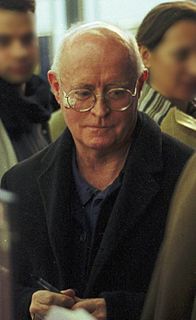A Quote by Hassan Blasim
In fact I didn't think about fear much at the time. I felt angry about everything that was happening around me: the violence of the dictatorship and the violence of society.
Related Quotes
Violence is not merely killing another. It is violence when we use a sharp word, when we make a gesture to brush away a person, when we obey because there is fear. So violence isn't merely organized butchery in the name of God, in the name of society or country. Violence is much more subtle, much deeper, and we are inquiring into the very depths of violence.
My approach to violence is that if it's pertinent, if that's the kind of movie you're making, then it has a purposeI think there's a natural system in your own head about how much violence the scene warrants. It's not an intellectual process, it's an instinctive process. I like to think it's not violence for the sake of violence and in this particular film, it's actually violence for the annihilation of violence.
We must realize that violence is not confined to physical violence. Fear is violence, caste discrimination is violence, exploitation of others, however subtle, is violence, segregation is violence, thinking ill of others and condemning others are violence. In order to reduce individual acts of physical violence, we must work to eliminate violence at all levels, mental, verbal, personal, and social, including violence to animals, plants, and all other forms of life.
Some studies have shown close to 70 percent of men who are in prison have one of two things in common: One, they can't read. And two, they witnessed violence or were victims of violence as a child. You would think that if you had seen your mother get beaten when you were 10 years old, you'd never raise your hand to a woman. Not true. The prospect that you will increases dramatically if you witness violence. So it's so much bigger than just about women. It's about our society. It's about our culture. It's about who the hell we are.
There's no violence worse than the violence of Iraq. For the last fifty years Iraq has been living a nightmare of violence and terror. It's been a horrible experience and people in Iraq will need a lot of time and work to get over the disastrous effects. But first we have to think about how to stop the violence, so that the bloodshed stops. In spite of everything, on the personal level I don't easily lose hope.
The science of war leads one to dictatorship, pure and simple. The science of non-violence alone can lead one to pure democracy. Power based on love is thousand times more effective and permanent than power derived from fear of punishment. It is a blasphemy to say non-violence can be practiced only by individuals and never by nations which are composed of individuals. The nearest approach to purest anarchy would be a democracy based on non-violence. A society organized and run on the basis of complete non-violence would be the purest anarchy.
When we speak about a culture of violence in the American society, we're not just talking about the mass killers. We're also talking about that we, as a society, and many of us as individuals accept violence as part of life because we have become numb to it, being so exposed to it in various forms of media.
I must remind you that starving a child is violence. Suppressing a culture is violence. Neglecting school children is violence. Punishing a mother and her family is violence. Discrimination against a working man is violence. Ghetto housing is violence. Ignoring medical need is violence. Contempt for poverty is violence.
We have a violence problem in America. And no one is having a debate about the violence problem. And I think this is a missed opportunity to have an honest and open conversation in this country about why these horrifying things are happening, not simply what they're using to carry this out, but why are people doing this to begin with?
I'm really interested in violence. And I think there's an inevitably cinematic property that violence brings to the moviegoing experience. But one still has to be thoughtful and mature about how you depict it and how you think it through. You have to think about the effects that violence has on audiences, and it's deployed so casually that I think it's losing its meaning. And when things like violence and murder and the dehumanization of other people lose their meaning, then we're really kind of in a place where we have to reexamine and take a hard look at ourselves.
My country has been wracked with violence for a long time. Just to see all the violence on the news makes you sick. It's true that violence is in our nature, but I try to explore deeply where it comes from and where it goes and what it creates. Not in a moralistic or preachy way, but just to observe the real consequences of violence in a human being or in a society.

































